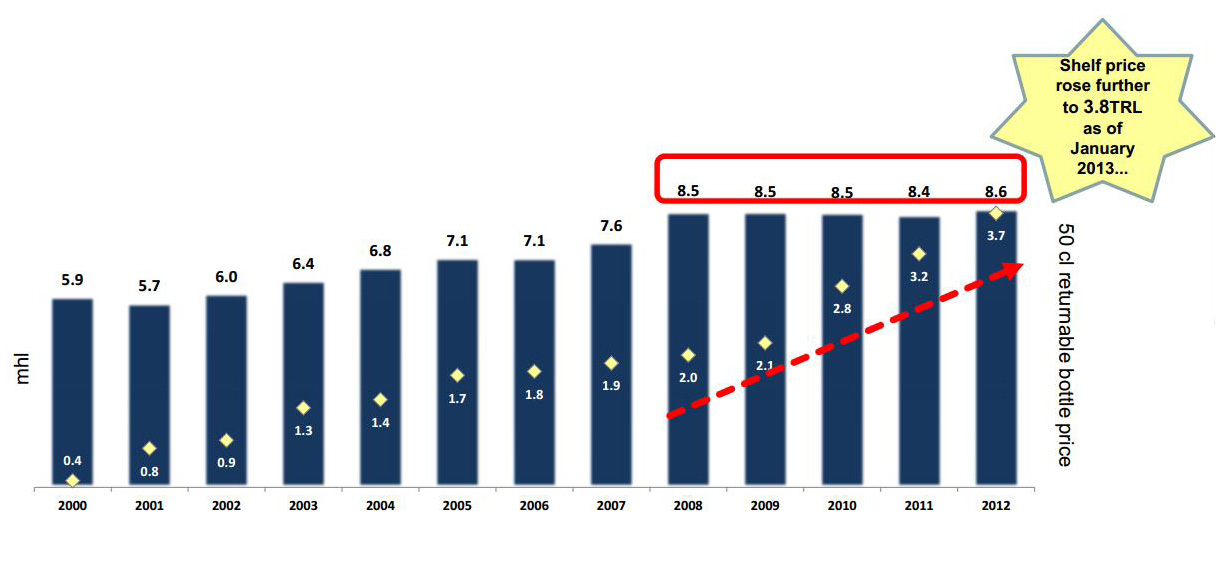Worries over tough new alcohol restrictions
A tax hike on alcohol of more than 340 percent - others say 700 percent - in a mere decade - what do you call that? Worrying, at least.
When Turkey's non-smoking and teetotal prime minister Recep Erdogan said in late April 2013 that Turkey's national drink was the non-alcoholic yogurt-based beverage ayran, not beer or the popular local liquor raki, Efes' executives should have seen the writing on the wall. A few weeks later, on 24 May, the so far tightest restrictions on alcohol advertising and sales were rushed through parliament.
The new bill bans shops from selling alcohol between 10 pm and 6 am and from displaying booze of any kind in windows. Restaurants up to 100 metres from schools or mosques cannot sell alcohol at all. What is more, spirits producers can no longer advertise or sponsor events. While not banning alcohol outright, these moves could seriously harm alcohol sales.
The news sent shares of Anadolu Efes, Turkey’s biggest brewer, down by 7 percent. Since April, when they stood at TRL 31 per share, they have dropped to TRL 24 (9 June).
Mr Erdogan argued that the law was to bring Turkey into line with other advanced economies such as the U.S., which he claimed had similar curbs on alcohol sales to prevent abuse.
"What is a state to do but protect its people, its youth from bad habits?" Mr Erdogan reportedly said on TV. "We don't want a generation that's drunk day and night."
Only a few days after the bill passed parliament, Turkey's "Tree Revolution" began with riots breaking out in Istanbul, Ankara, the Turkish capital, and elsewhere across the country. Although several western media were quick to comment that these demonstrations were all about secularists versus Islamists, diplomats say the current civil conflict is all about pluralism versus authoritarianism, according to The Economist.
A decade of rule by Mr Erdogan's "mildly Islamist" government, as The Economist calls it, has brought Turkey unprecedented prosperity. Per-capita income has trebled, exports have increased nearly tenfold and Turkish banks are in good health.
Nevertheless, Turkey today feels a lot more conservative than a decade ago, if Mr Erdogan's measures against alcohol are an indication.
Anadolu Efes, Turkey's major brewer said in May that, because of steep annual excise hikes, retail prices for beer have almost doubled between 2008 and 2012. In January 2013 a 500 ml bottle of beer cost TKL 3.80 (USD 2.0). That Efes has maintained its domestic sales volumes over all those troublesome years can be interpreted in two ways: for one, Turkish consumers have become more affluent and consequently are more willing to accept higher prices. For another, those who actually consume alcohol must be considered a minority of Turks. In a country of 75 million people, per capita consumption of beer is only 13 litres per year. Total alcohol consumption is 1.0 litre per capita. These figures must be Europe's lowest.
In Turkey, Anadolu Efes has an 83 percent share of the beer market. The company conducted a series of international acquisitions in the past two decades to decrease its dependency on Turkey. Still, its home turf, in terms of volumes, represents 10 percent of group volumes, yet 43 percent of group EBITDA. Its soft drinks operations were 55 percent of total EBITDA, while its international beer operations brought in just 2 percent (2012).
Fortunately, its shareholder SABMiller, who in 2011 traded its Russian and Ukrainian units in exchange for a 24 percent stake in Anadolu Efes, should be familiar with political risk.
Unsurprisingly, being a Turkish company, Anadolu Efes refrained from publically commenting on the new law. Not so Diageo, the world’s largest distiller of alcoholic beverages, which expressed concern over the proposed curbs. As a spirits producer Diageo will be hit harder than brewer Efes.
Diageo paid USD 2.1 billion in 2011 for Mey Icki, a producer of the traditional Turkish spirit raki. The London-based company said in May that it had invested in “a company with strong alcoholic trademarks and in a country which was encouraging foreign investments”, according to media sources.
Pernod Ricard, the number two spirits maker in Turkey, said it too was disappointed because it had not been consulted, Reuters reports.
Some hope rested on Turkey's President Abdullah Gul. He had said that "if there are any constitutional problems [in the bill], I will do what’s necessary." The president has to sign the legislation before it comes into effect, which he did on 10 June 2013.
Despite significant excise tax hikes, Efes mainted beer volumes

